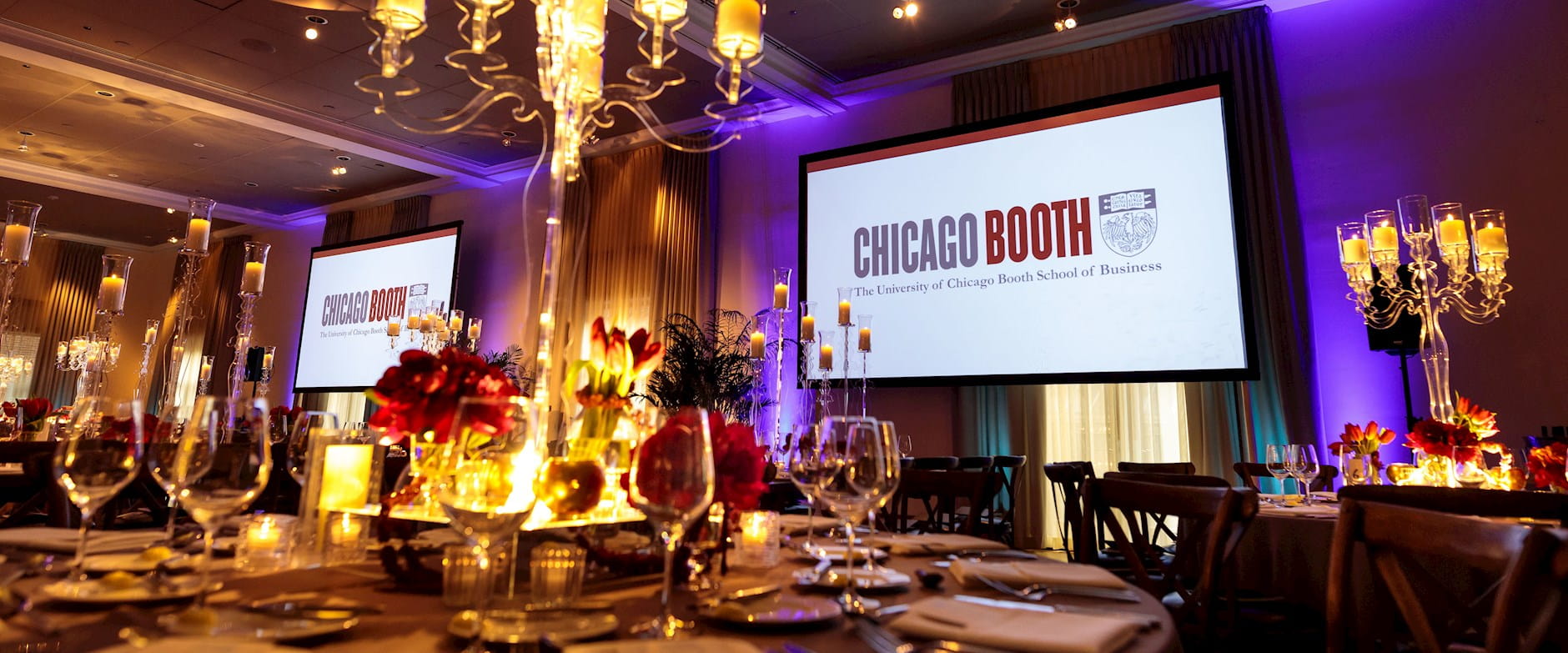Daniel Anello, ’07
CEO, Kids First Chicago
Young Alumni Award
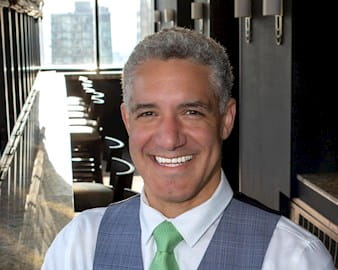
Daniel Anello believes that parents should have input on decisions that affect their children’s education. It’s not a radical concept, but it’s often ignored in practice. “Whoever has power and money is determining what US education policy looks like and imposing that ideology on communities of color,” he says. Anello and his team want to change that.
Anello is the CEO of Kids First Chicago, a nonprofit parent advocacy organization founded in 2015. Kids First Chicago (K1C) takes a service-based approach to centering the wants and needs of low-income families of color in shaping education public policy. K1C provides parents with information and resources to better understand what is happening within Chicago Public Schools and supports them in elevating their concerns as they advocate for improvements to their schools and the system.
During the COVID-19 pandemic, Anello and his team worked with K1C’s parent network to quantify the disproportionate impact that a lack of in-home internet access had on low-income families on color. K1C developed a data-rich case on Chicago’s “digital divide” and then worked with the City of Chicago to create the Chicago Connected program, a public-private partnership that has provided more than 100,000 students with access to free high-speed internet. Anello received a Mayor’s Medal of Honor from former Chicago mayor Lori E. Lightfoot for his work on the initiative.
Anello’s curiosity and willingness to consider new perspectives aid his work. They’re also the values that brought him to Booth. In a marketing strategy class taught by Robert Zeithammer (now at the University of California at Los Angeles), he learned to center the perspective of the consumer in developing a product and corresponding marketing strategy.
After two years in marketing, Anello felt a calling toward work that would advance racial and educational equity. Inspired by his parents, who were both public-school teachers, he participated in the Broad Residency in Urban Education, an intensive, two-year management program for people who want to support children being educated in city public school systems. He became director of external relations and chief of strategy for Chicago International Charter School before founding Kids First Chicago.
Looking forward, Kids First Chicago is supporting parents in advocating for adequate and equitable funding, high quality teaching, and social emotional learning. As Chicago’s school board transitions to be fully elected by 2027, Anello and his team are calling for fair and functional school governance that represents the lived experiences of students, gives non-citizen public school families an equal say, and creates measures for everyday parents to participate. Everything that K1C is pursuing has been vetted by Chicago families.
“It’s very easy, particularly in public education, to have an ideology about what the right answer is,” he says. “To me, it’s like, how do we start to think differently about who should have the final decision and make sure those people are centered? There’s a tremendous power and more durability in the solutions when you do the work that way.”
Roopa Gandhi, ’96
Founder and President, GEP
Entrepreneurial Award
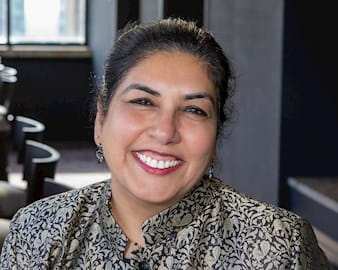
A few years ago, Roopa Gandhi was cleaning out her basement when she came across a paper she had written for a Booth strategy class taught by Harry L. Davis, the Roger L. and Rachel M. Goetz Distinguished Service Professor of Creative Management Emeritus. The assignment asked students to design a strategy for their lives.
Gandhi listed four options: she and her husband, Subhash Makhija, ’96, could be consultants; he could work in consulting and she could take a corporate job; she could start a business; or they could start a business together.
After experimenting with some of those combinations, Gandhi and Makhija ultimately chose the final option, launching their own company with fellow Booth graduate Jagadish Turimella, ’97. Today, their Clark, New Jersey–headquartered procurement and supply-chain software firm, GEP, has more than 6,000 employees around the world.
“Once you put something down on paper, the universe conspires to make it a reality,” Gandhi says.
But it would be misleading to describe the path to where she is today as a straight line. Gandhi hadn’t intended to go to business school, but applied to join Makhija, who was spending much of his time commuting to weekend classes from New Jersey.
At Booth, she sometimes struggled with the coursework, but learned resilience and persistence from Selwyn W. Becker, the late professor emeritus of psychology and quality management, who gave students detailed feedback and allowed them to resubmit assignments until they succeeded. And the late professor Marvin Zonis, professor emeritus of business administration, taught her how to use time effectively—advising students to rip out and save relevant articles to read in snatches of down time.
After graduation, she worked in consulting but was let go. Another job in the pharmaceutical industry ended after six months. Gandhi was flummoxed. She came to recognize that corporate life was not the best fit for her.
Around that time, Gandhi, Makhija, Turimella, and fourth cofounder Neha Desai Shah, who joined a few months later, started developing their business plan. Steve Kaplan, the Neubauer Family Distinguished Service Professor of Entrepreneurship and Finance and the Kessenich E. P. Faculty Director of the Polsky Center for Entrepreneurship and Innovation, introduced them to an angel investor who, along with another angel, helped to support a seed funding round for $2.5 million.
That was in April 2000, right before the dot-com bust. A second round never materialized. Investors asked them to close the business for the tax write-off, but the cofounders persisted and pivoted.
“For me, because I had already failed twice, failure was not an option,” Gandhi says. “We all refused to give up.”
Nearly 25 years later, when she speaks with new hires at GEP, they often have trouble imagining that they, too, could face setbacks in life. “But invariably there are going to be times in your life when things don’t go your way,” she says. “If there are others going through tough times and I can inspire or challenge even a single person reading this story to persevere, I’ll have accomplished my mission.”
Ann Mukherjee, AB ’87, MBA ’94
Chairwoman and CEO, Pernod Ricard North America
Corporate Award
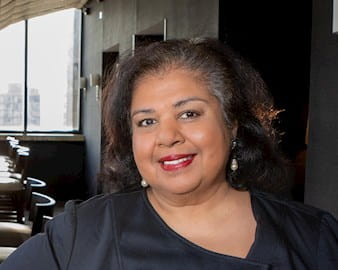
Ann Mukherjee’s career-defining moments have been the result of calculated risk. At Frito-Lay, she helped to create a competition inviting consumers to produce their own Doritos ads, with the winner airing during the Super Bowl. She spurred the creation of the Doritos Locos Taco at Taco Bell, which added $1 billion to Doritos sales. At liquor company Pernod Ricard North America, where she is chairwoman and CEO, Mukherjee led the memorable #SexResponsibly campaign for Absolut Vodka, in which the brand promoted consent and donated $1 for every share and retweet, and she even shared her own story of sexual assault with Glamour magazine as part of the campaign.
Her best work comes from combining logic and instinct. It’s what she learned at Booth—but it was a difficult lesson. She had earned her bachelor’s degree in economics and religious theology at the University of Chicago. She returned to the campus at a personally challenging time. “I was looking for a sanctuary,” she says. “I didn’t know what I wanted to do in my career, but whatever I chose, I wanted to be the best at it.”
But Mukherjee struggled with her first marketing case course, failing her assignments. When she expressed frustration, a friend at another school offered to share her notes on an upcoming case. After she submitted her next paper, the professor told her she had a meeting with Harry L. Davis, Booth’s dean at the time, to talk about expulsion proceedings. Mukherjee hadn’t realized: her friend had shared the answer key.
In their meeting, Davis said to Mukherjee, “I’m going to ask you one question: What did you learn?”
Mukherjee took some time before responding, “I think this is the first time in my life that I realized it’s not about being right; it’s about doing what is right.” He let her stay.
She was still failing the class, and the final was worth 70 percent of her grade. When Mukherjee sat down to the exam, she stopped overthinking her answers. She simply let her instincts and what she had read in the case guide her. She received the highest grade on the final and passed the course—and went on to years of increasing success in business, culminating in her current role as chairwoman and CEO.
“I’ve credited Dean Davis for my entire career,” Mukherjee says. “That changed how I looked at the world, how I led, how I became a parent. It was one of the defining moments in my life.”
As a leader, she has learned to be vulnerable, to listen, to believe in human resiliency, and to trust her ideas and experience. Her creativity and business skills have made her a global force in marketing. Mukherjee has come a long way, but she never forgets her foundation. “I think Booth is such an amazing place, and you shouldn’t underestimate what you learned,” she says, “because you can change the world.”
Brenda Wolf, ’88
President and CEO, La Rabida Children’s Hospital
Public Service Award
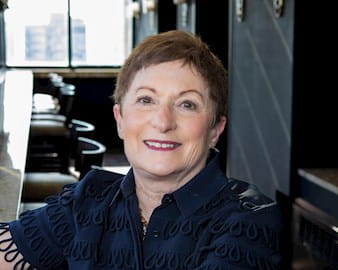
Over the course of a career serving children with complex medical needs, Brenda Wolf has learned to measure progress in small steps. In many cases, “we’re not going to be able to cure our patients,” says Wolf, president and CEO of La Rabida Children’s Hospital in Chicago. “The best thing we can do is help their lives be as great as possible.”
Wolf has learned to be savvy, creative, and persistent to reach her goals. La Rabida depends heavily on Medicaid. Improvements that matter enormously to a family—such as a child with cerebral palsy being able to walk instead of using a wheelchair—may not be reimbursed appropriately by insurers. Wolf works with her staff, board, donors, the State of Illinois, and others to provide the specialized care her patients deserve.
While at Booth, Wolf took a course in healthcare administration that underscored the importance of nurturing this complex network of relationships. “A physician came in to talk about how physicians are trained and told us that we need to keep in mind, they’re not trained to be team players,” she recalls. “Yet you really need a team to operate in healthcare. That always resonated with me.”
Wolf also began to understand at Booth how marketing is part of every aspect of business. “You have to use marketing to recruit, just like you would to sell a product,” she says. “It’s how you work with donors; it’s how you work with government officials. You have to understand where they’re coming from and what their needs are, and you have to accommodate that.”
After graduating from Booth, Wolf joined La Rabida, as its first marketing director. “I soon learned that marketing only works if you can fulfill the promise,” she says. She began volunteering to fix administrative issues, then became more involved with government relations. She was promoted to COO in 2006 and president and CEO in 2011, becoming the first non-physician CEO in La Rabida’s history.
Today, the hospital serves more than 9,000 children each year, including those with chronic health conditions, such as diabetes and sickle cell disease, and those with developmental disabilities, such as cerebral palsy and Down syndrome. La Rabida celebrated its 125th anniversary in 2021.
Wolf still draws on the fundamental lessons she learned from Booth, as well as the example of her parents, Otto and Hilda Wolf, who fled Nazi Germany with their families as teenagers. “They succeeded here, and they really instilled in my sister and me the idea that you had to work hard, that education was everything,” Wolf says, “and that you had to give back.”


